The story of increasing enrollment resulting in new instructors, reductions in teaching space, and revisions in course structure: OR How a critical analysis of a Mason Core course created and confirmed a positive change for students
Several dilemmas were facing Mason’s COMM 100 and 101 courses:
- enrollment topping a record 4,000+ students
- an ever-changing and often novice set of 50-60 of instructors and the corresponding need to ensure teaching consistency and quality
- reduced classroom availability
- three different delivery methods, with no real data on what version was most successful
The question became how to wrestle these problems while maintaining and/or improving failure rates. While the process was pivotal, successful outcomes were vital.
Such was the concern for Dr. Melissa Broeckelman-Post, the Basic Communication Course Director, an Associate Professor in the Department of Communication and a Senior Scholar in the Center for the Advancement of Well-Being at Mason. She is responsible for planning, supervising, assessing, and improving the communication courses that meet the general education requirement at Mason.
Broeckelman-Post recognized she needed to put some serious analytical insight into best practices for this course — from materials and methodologies to delivery methods and student results. But how to pull off this important, yet complex, analysis while juggling an already full schedule?
The answer was found in a grant from 4-VA at Mason.
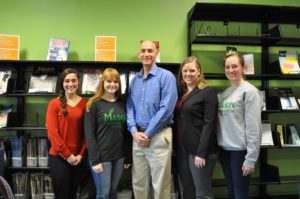
Armed with the financial support to hire a cadre of Ph.D. students to produce the “in the weeds” analysis, in one short year, Broeckelman-Post had both the necessary numbers and the path to developing and delivering a course that met the needs of the students and produced a blueprint for a pedagogical “win.” The research focused on pre- and post- course student surveys which considered communication apprehension, interpersonal communication competence, communication competence and engagement. Additionally, the analysis considered grades, attendance records, and a detailed review of more than 300 explanatory speeches, a required 5- to 7-minute presentation by all students. Four expert coders evaluated the presentations for five different elements – introduction, body, conclusion, overall impression and delivery.
Then, this analysis was applied to the two different delivery versions of the course: Face-to-Face and a fully online course, plus a pilot of a new version of the course which is based on a lecture/lab/speech lab format.
The results pointed to the newer version of the class.
In this version, Broeckelman-Post delivers an online media-rich introduction, with includes content overviews, readings, TED talks, model speeches, video analysis and pre-class activities. This not only assured a complete and thorough content delivery, it also saved precious classroom space. Last spring, this version was pilot tested in six sections of the course, and after seeing the results of this study, has been implemented for 100 sections this academic year.
The introduction is then followed by small group interactive face-to-face lab with discussions, interviews and group work presentations.
The bonus comes in the final element of the course that was added for the fall semester – individualized coaching sessions in the new 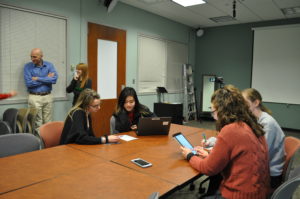 Communication Center for all students enrolled in the course. In the Communication Center, which is funded by the cost savings from moving the first hour of the course online, students meet with student Communication Coaches to get feedback on outlines, video record and practice presentations, practice interviews, work on developing group presentations, and more. Most of the Coaches are members of Mason’s nationally-renowned forensics and debate teams, graduate students who also teach the course, and students who have demonstrated outstanding communication and feedback skills, who are able to share their advanced training with students that are just getting started.
Communication Center for all students enrolled in the course. In the Communication Center, which is funded by the cost savings from moving the first hour of the course online, students meet with student Communication Coaches to get feedback on outlines, video record and practice presentations, practice interviews, work on developing group presentations, and more. Most of the Coaches are members of Mason’s nationally-renowned forensics and debate teams, graduate students who also teach the course, and students who have demonstrated outstanding communication and feedback skills, who are able to share their advanced training with students that are just getting started.
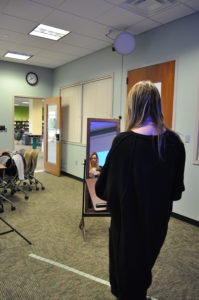 The Communication Center is a ‘one stop shop’ for valuable one-on-one coaching sessions for students as they prepare presentations. Currently, the Center is open every day between 10:00 AM and 5:00 PM and books more than 300
The Communication Center is a ‘one stop shop’ for valuable one-on-one coaching sessions for students as they prepare presentations. Currently, the Center is open every day between 10:00 AM and 5:00 PM and books more than 300 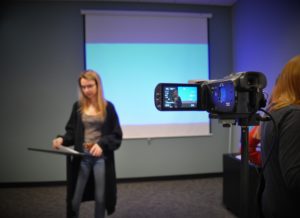 appointments a week. It is anticipated that number will balloon as more students recognize the benefit of the help.
appointments a week. It is anticipated that number will balloon as more students recognize the benefit of the help.
“The bottom line of this effort is that we’ve produced a course pathway that provides the best possible outcomes for our undergraduate students, while supporting our instructors with a rich resource of teaching tools and techniques,” explains Broeckelman-Post. “What’s more, we’ve streamlined the course and saved some money, which we then were able to use to create our first-of-its-kind on-campus Communication Center. We are very proud that we were able to deliver this terrific outcome for all Mason students — thanks to our 4-VA grant!”
Communication Research and the Communication Center: It takes a team
Broeckelman-Post credits much of the success of this research project to the graduate student research team, which includes an ace crew of PhD candidates and a student earning her Masters. Katherine Hyatt Hawkins, Andie Malterud, and Anthony Arciero worked on the 4-VA grant, and Hyatt Hawkins and Briana Stewert are working on a subsequent research grant that is evaluating the added impact of the Communication Center.
Katherine Hyatt Hawkins is a third year PhD candidate in Communication who will graduate in May 2019. She studies health and instructional communication, and is currently managing the Communication, Health, and Relational Media (CHARM) Lab for the Communication department with Dr. Sojung Kim. Hyatt Hawkins served as the Basic Course Assistant and has helped to build the Communication Center. Hyatt Hawkins’ resume also includes internships at the Food and Drug Administration (FDA) and the National Cancer Institute (NCI).
Andie Malterud is a second year PhD student in Communication and is the Communication Center Coordinator. She also studies health and instructional communication and has served as the Basic Course Assistant. Malterud comes to Mason following her undergraduate and Masters work in South Dakota.
Anthony Arciero is now in his fourth year of a PhD program, with a specialization in Educational Psychology, and a secondary emphasis in Research Methodology. Arciero also works in the College of Education and Human Development in the Accreditation and External Reporting Office as a Graduate Research Assistant. He is a 22-year veteran of the Air Force, retiring as a Lieutenant Colonel.
Briana Stewart is a first year MA student in Communication and is the Assistant Communication Center Coordinator this year. She previously worked in the writing centers at Oakton High School and Christopher Newport University. Stewart and Malterud are currently working on a follow-up project funded by a Curriculum Impact Grant and Faculty Research Development Award to help evaluate the impact of the Communication Center.

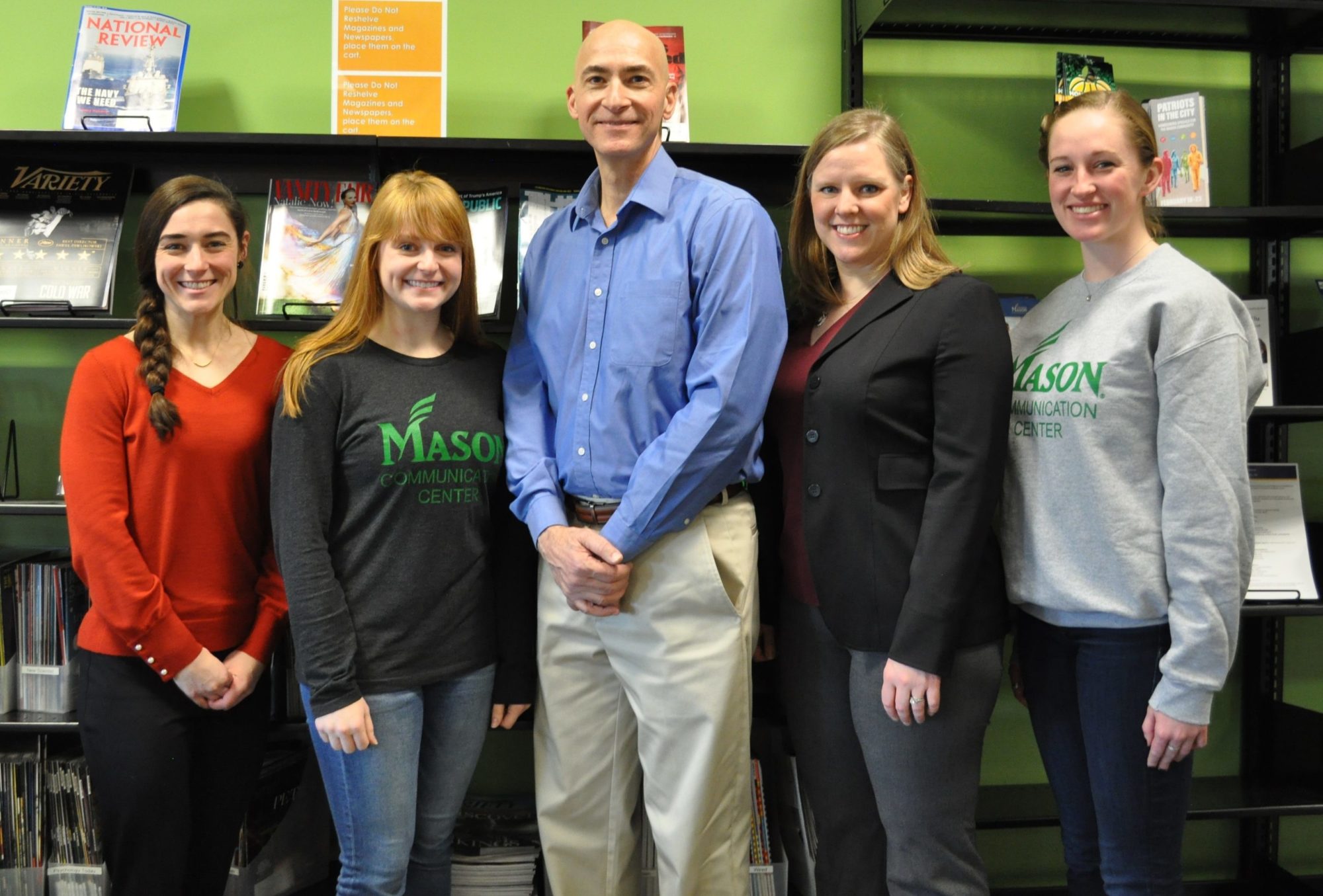
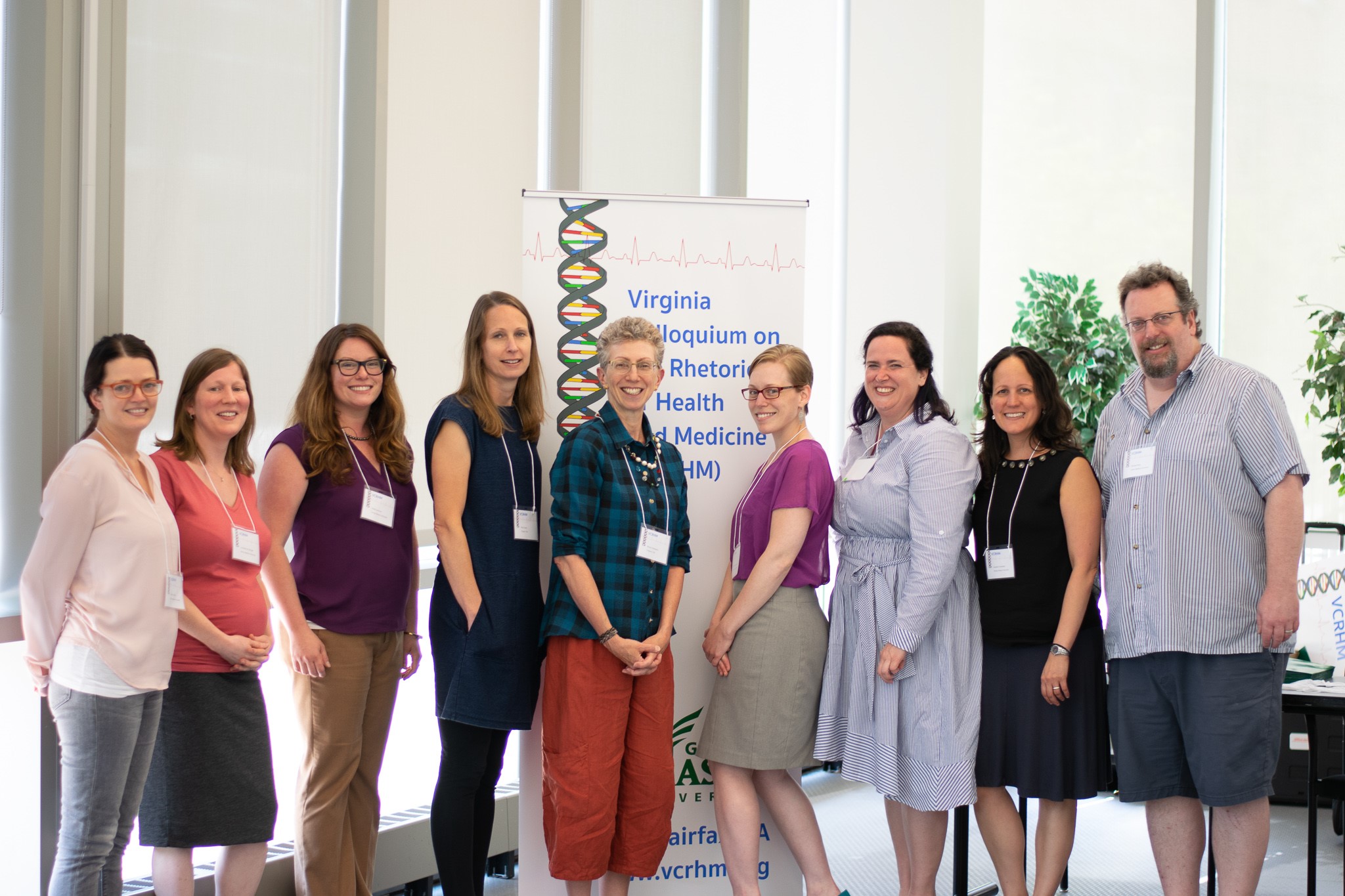
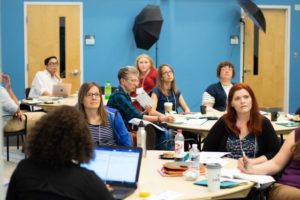 The grant provided the funding for a first-of-its-kind statewide symposium “The Virginia Colloquium on the Rhetoric of Health and Medicine” (VCRHM).
The grant provided the funding for a first-of-its-kind statewide symposium “The Virginia Colloquium on the Rhetoric of Health and Medicine” (VCRHM).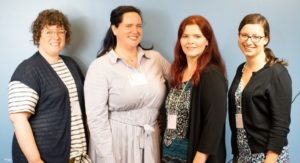
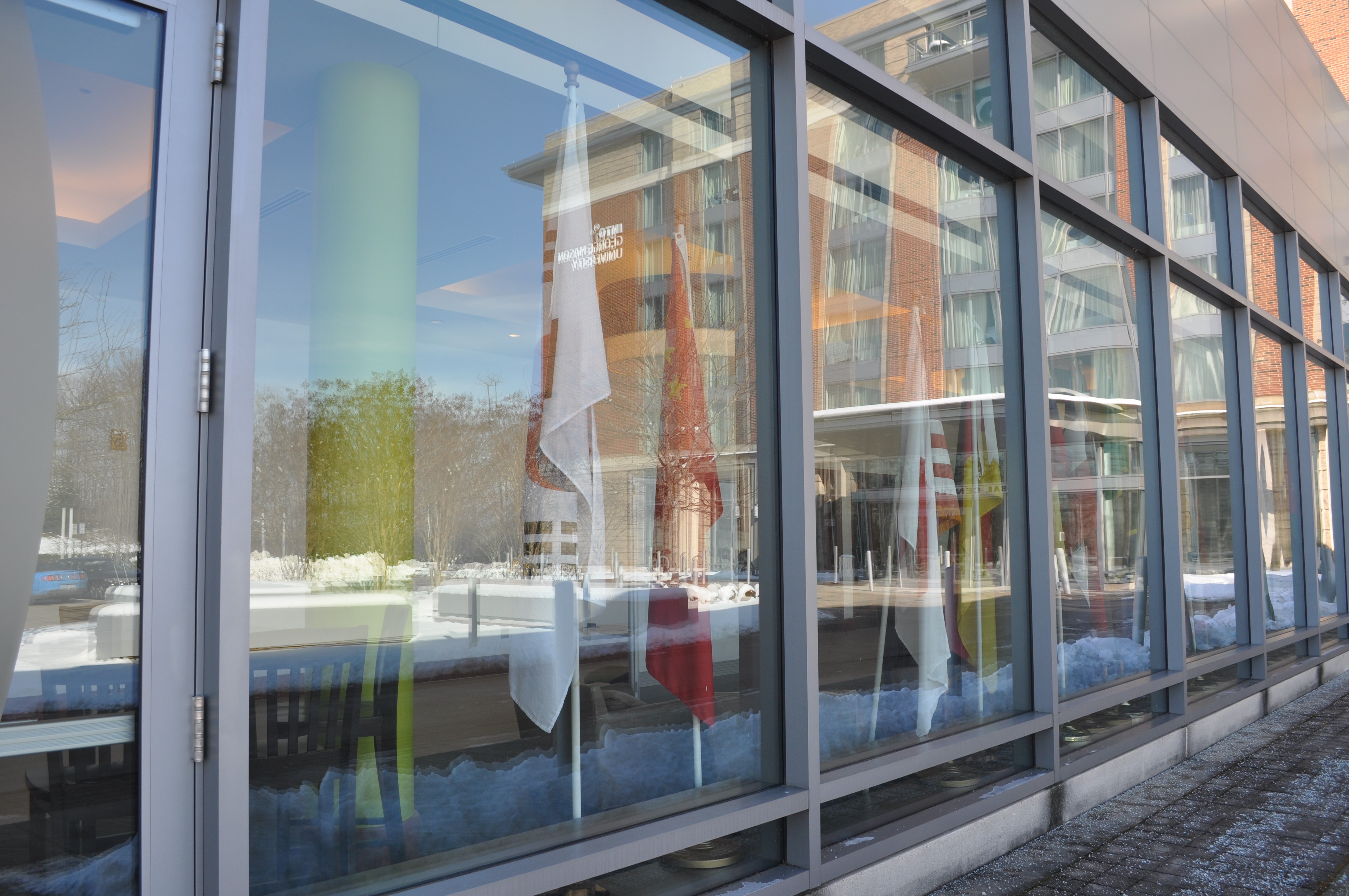
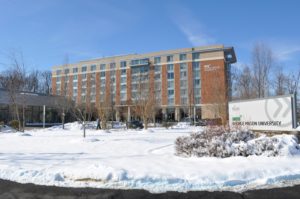 With no existing road maps for multilingual student success, Mason INTO has joined with the Stearns Center to develop a ground-breaking effort to harness this resource and create a path for faculty and students to support them on their academic journey.
With no existing road maps for multilingual student success, Mason INTO has joined with the Stearns Center to develop a ground-breaking effort to harness this resource and create a path for faculty and students to support them on their academic journey.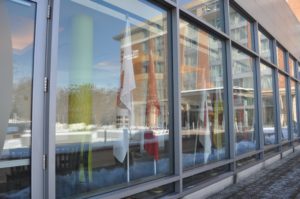 “At Mason, we pride ourselves on our diversity, but we can’t just point to our population numbers and say ‘look at us’ — we want and need to do more. Our focus is to develop Mason’s agility and ability to work across cultures and languages,” explains INTO’s Interim Academic Director Karyn Kessler. “We have a treasure trove at our fingertips which we can use to prepare Mason grads to have a global mindset and to work on global problems.”
“At Mason, we pride ourselves on our diversity, but we can’t just point to our population numbers and say ‘look at us’ — we want and need to do more. Our focus is to develop Mason’s agility and ability to work across cultures and languages,” explains INTO’s Interim Academic Director Karyn Kessler. “We have a treasure trove at our fingertips which we can use to prepare Mason grads to have a global mindset and to work on global problems.”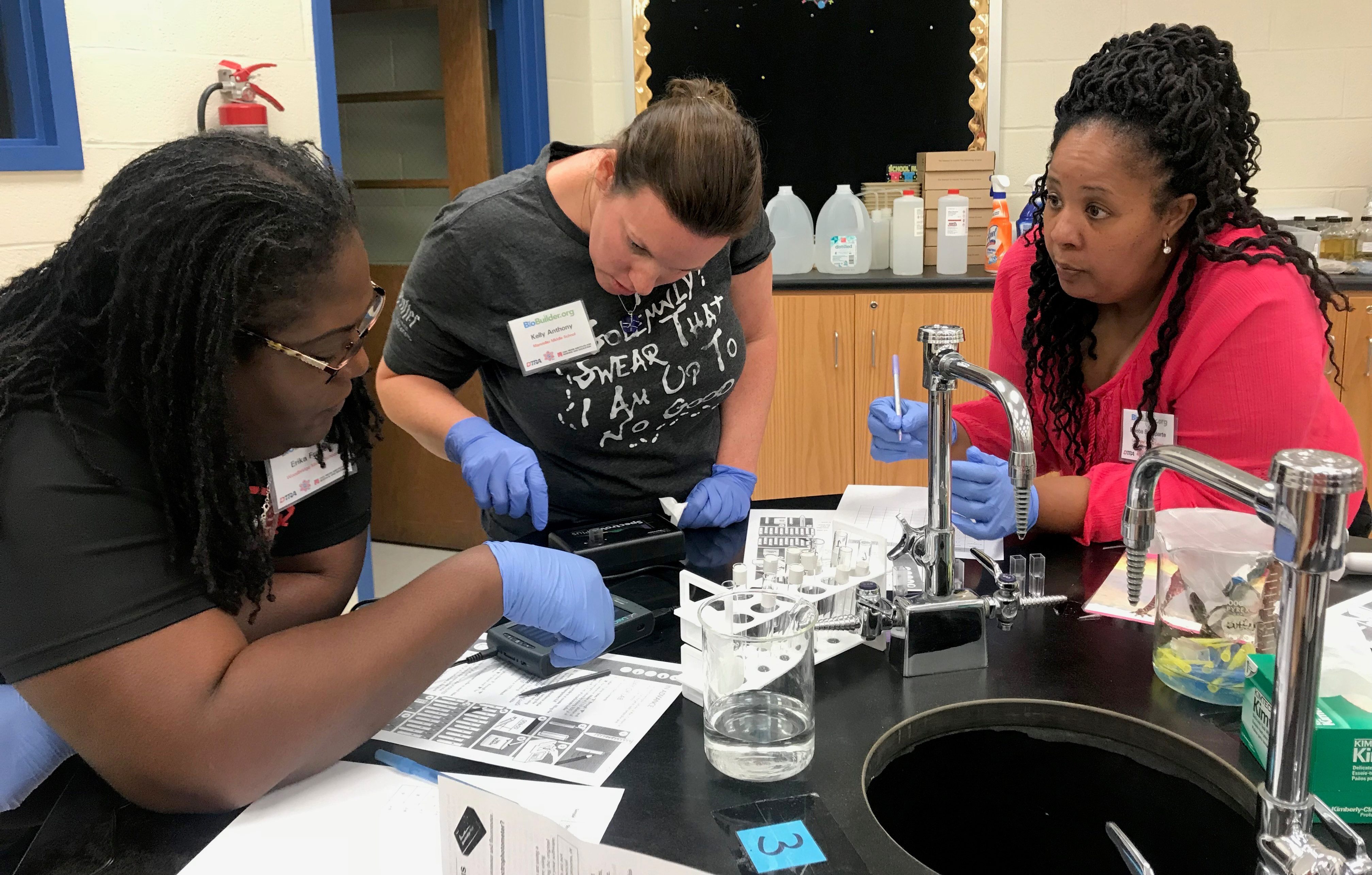
 As a former high school science teacher at Chantilly and Thomas Jefferson in Fairfax County, Andrea Cobb, (PhD in biochemistry) saw the difference with her own eyes. After sending her students off to a summer research experience through Mason’s Aspiring Scientist’s Summer Internship Program (ASSIP), they would return in the fall as changed students. “They came back to school looking and sounding like inspired scientists, with a resume full of authentic research under their belts. I could see the difference in their eyes and read it in their papers,” says Cobb.
As a former high school science teacher at Chantilly and Thomas Jefferson in Fairfax County, Andrea Cobb, (PhD in biochemistry) saw the difference with her own eyes. After sending her students off to a summer research experience through Mason’s Aspiring Scientist’s Summer Internship Program (ASSIP), they would return in the fall as changed students. “They came back to school looking and sounding like inspired scientists, with a resume full of authentic research under their belts. I could see the difference in their eyes and read it in their papers,” says Cobb.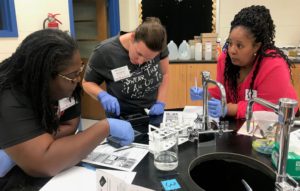 STEM access to real-world, research. ASSIP attracts students from a wide range of schools — from Virginia (including UVA and William and Mary), to California, (including Stanford and Berkeley), as well as students from smaller schools like Troy University and Carleton College. Mentors from Mason’s College of Science donate their time each summer to deliver this rich experience.
STEM access to real-world, research. ASSIP attracts students from a wide range of schools — from Virginia (including UVA and William and Mary), to California, (including Stanford and Berkeley), as well as students from smaller schools like Troy University and Carleton College. Mentors from Mason’s College of Science donate their time each summer to deliver this rich experience.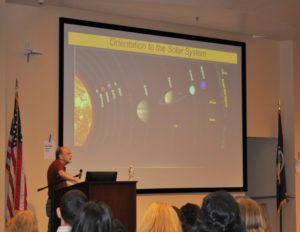
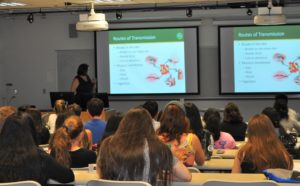
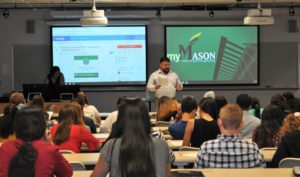
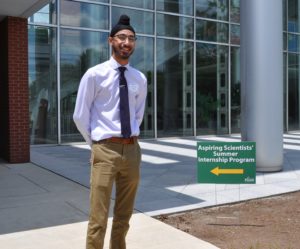 a lot of strengths going through this program, but, importantly, I also learned a lot about my weaknesses, it showed me where I needed to focus to make the most of my time here,” said Bedi. “This program fosters creativity, imagination, and collaboration — it’s truly exciting.” Bedi emphasizes the importance and value of working with a mentor. “I was able to do research with Dr. Caroline Hoemann last year, who is in the Bioengineering Department. We analyzed white blood cell movement and how that might be applied to cancer research and therapy.” Bedi is clearly passionate about his work through ASSIP, but credits the program for giving him hands-on access to important research that brings his passion to life.
a lot of strengths going through this program, but, importantly, I also learned a lot about my weaknesses, it showed me where I needed to focus to make the most of my time here,” said Bedi. “This program fosters creativity, imagination, and collaboration — it’s truly exciting.” Bedi emphasizes the importance and value of working with a mentor. “I was able to do research with Dr. Caroline Hoemann last year, who is in the Bioengineering Department. We analyzed white blood cell movement and how that might be applied to cancer research and therapy.” Bedi is clearly passionate about his work through ASSIP, but credits the program for giving him hands-on access to important research that brings his passion to life.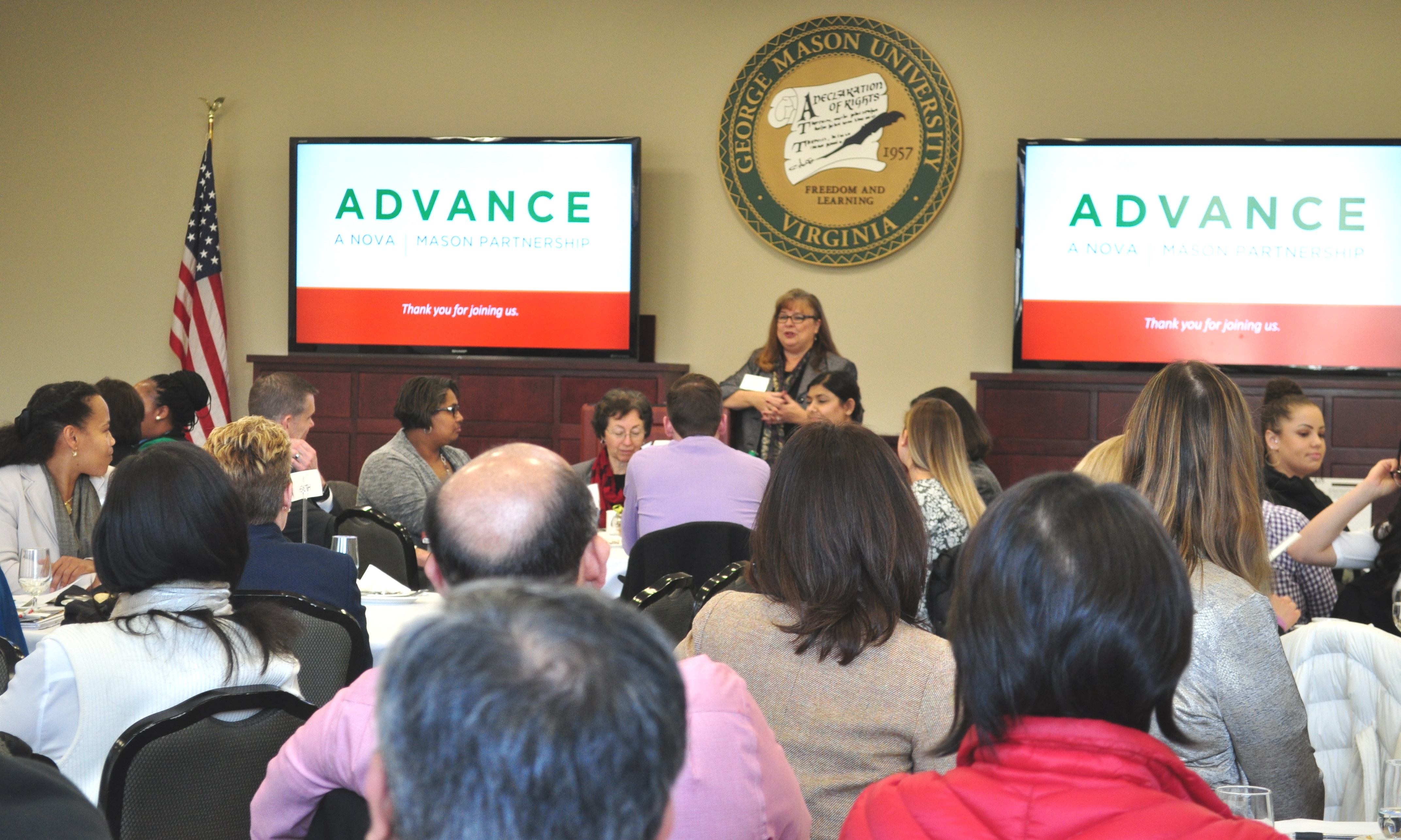
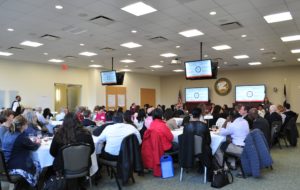
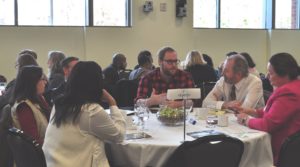 the future employee skill sets desired in the two sectors with an eye toward building educational curricula for the Mason/NOVA ADVANCE students to meet those needs. “We recognize the importance of building relationships with the business community so that we can work together to build the employee workforce necessary to be successful,” explained Janette Muir, Associate Provost for Academic Initiatives and Services at Mason, one of the hosts of the event.
the future employee skill sets desired in the two sectors with an eye toward building educational curricula for the Mason/NOVA ADVANCE students to meet those needs. “We recognize the importance of building relationships with the business community so that we can work together to build the employee workforce necessary to be successful,” explained Janette Muir, Associate Provost for Academic Initiatives and Services at Mason, one of the hosts of the event.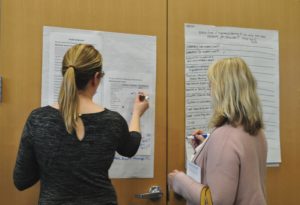 The Summit produced an array of concrete steps to begin to integrate not only the hard, technical skills needed by the business community but also a detailed list of “soft” skills important in any office environment, including communication tools and techniques, office protocol, business development and team building.
The Summit produced an array of concrete steps to begin to integrate not only the hard, technical skills needed by the business community but also a detailed list of “soft” skills important in any office environment, including communication tools and techniques, office protocol, business development and team building. 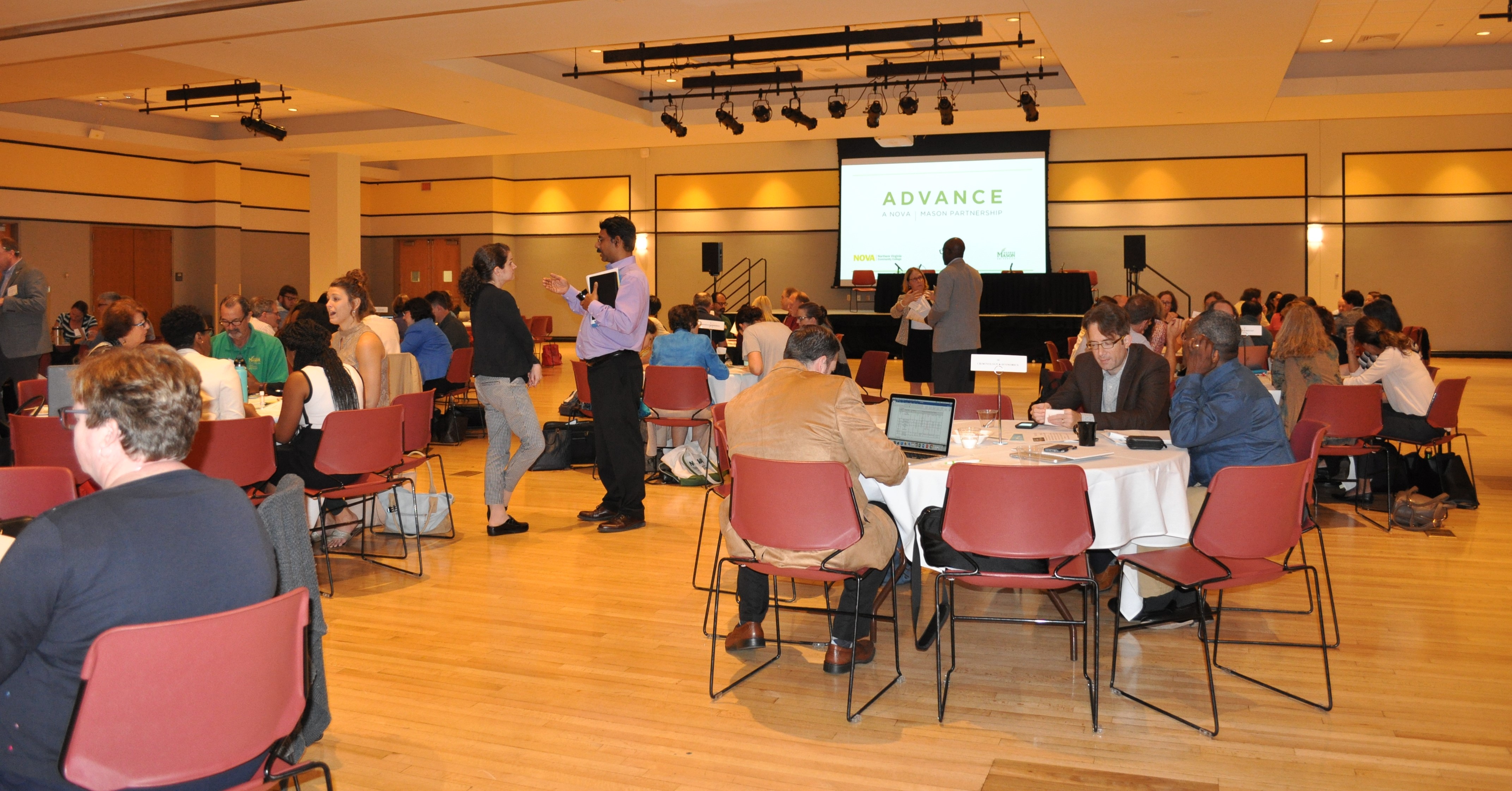
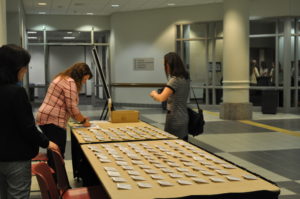 Virginia Community College (NVCC) and George Mason University volunteered to spend their day off recently aligning courses and designing curricula to help provide a streamlined transition for NVCC students interested in transferring to Mason for a four-year degree.
Virginia Community College (NVCC) and George Mason University volunteered to spend their day off recently aligning courses and designing curricula to help provide a streamlined transition for NVCC students interested in transferring to Mason for a four-year degree. 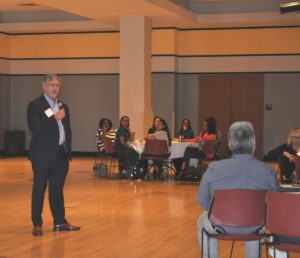 NVCC President Dr. Scott Ralls opened the conference by noting several obstacles facing students in the current transfer process, including a lack of clarity regarding prerequisite courses, confusion due to separate guidance services, and often-tedious paperwork; all resulting in a loss of an average of 15 credits per student. “This meeting is important and historic. Rarely do groups of faculty get together to take on this difficult process – in this room we have educators that care about their students. We’re part of something bigger than ourselves and our institutions,” explained Ralls.
NVCC President Dr. Scott Ralls opened the conference by noting several obstacles facing students in the current transfer process, including a lack of clarity regarding prerequisite courses, confusion due to separate guidance services, and often-tedious paperwork; all resulting in a loss of an average of 15 credits per student. “This meeting is important and historic. Rarely do groups of faculty get together to take on this difficult process – in this room we have educators that care about their students. We’re part of something bigger than ourselves and our institutions,” explained Ralls. process, providing access to Mason student life, and streamlining enrollment and registration services, participants broke into groups based on their areas of study and got to work. Professors attending the conference came from a variety of departments including Health, Information Technology, Math, English, Education, Visual Design and the Sciences. At the conclusion, each group created a “pathway” worksheet, outlining each of their courses and the necessary steps to merge or mirror them.
process, providing access to Mason student life, and streamlining enrollment and registration services, participants broke into groups based on their areas of study and got to work. Professors attending the conference came from a variety of departments including Health, Information Technology, Math, English, Education, Visual Design and the Sciences. At the conclusion, each group created a “pathway” worksheet, outlining each of their courses and the necessary steps to merge or mirror them.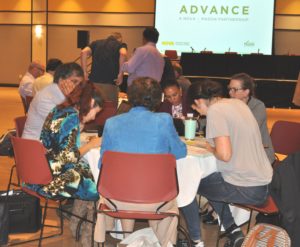 rts here today.”
rts here today.”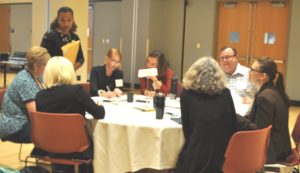
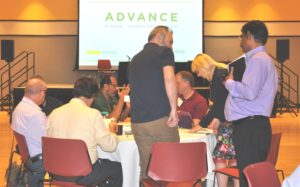
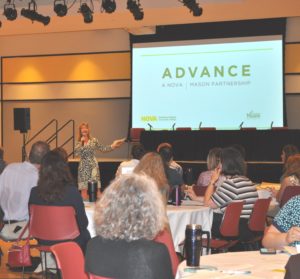
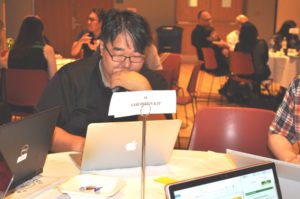
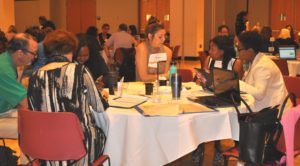
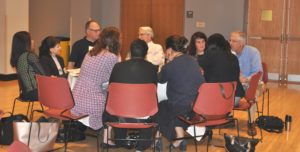
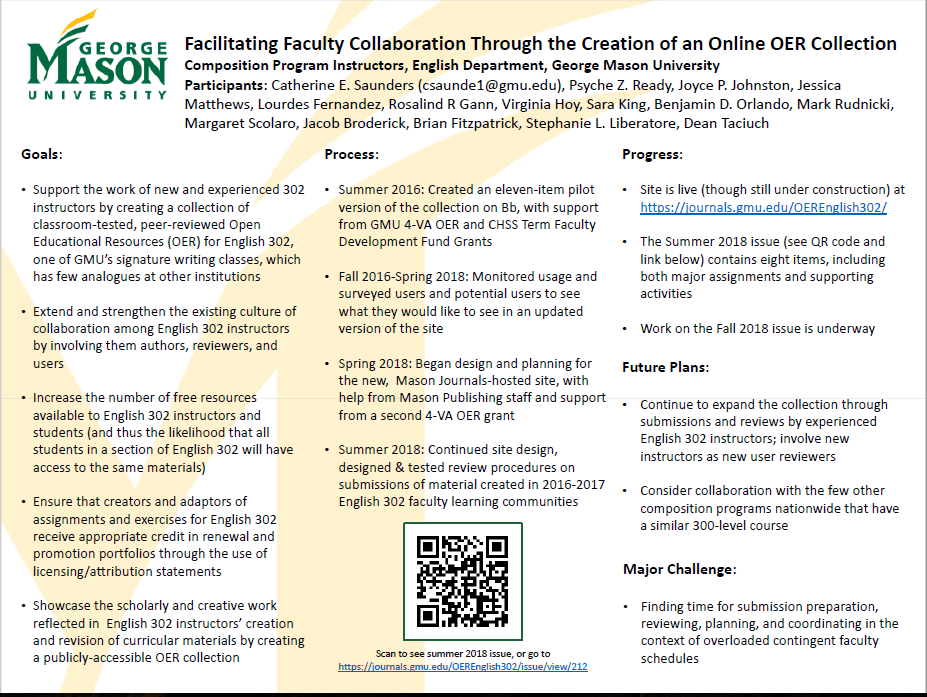
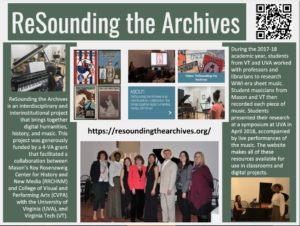 “ReSounding the Archives” was the result of a collaboration of archivists, librarians, faculty, and students from Mason, and two other 4-VA institutions — University of Virginia and Virginia Tech — to delightfully bring the music of World War I to life and open the door to the power of the message behind America’s most popular songs of the time. Through research and recordings of WWI era sheet music, including cover art, musical notations and lyrics, the group dissected the scores, performed 18 different popular songs, and produced a website to share the entertaining results with the world. Visit
“ReSounding the Archives” was the result of a collaboration of archivists, librarians, faculty, and students from Mason, and two other 4-VA institutions — University of Virginia and Virginia Tech — to delightfully bring the music of World War I to life and open the door to the power of the message behind America’s most popular songs of the time. Through research and recordings of WWI era sheet music, including cover art, musical notations and lyrics, the group dissected the scores, performed 18 different popular songs, and produced a website to share the entertaining results with the world. Visit 
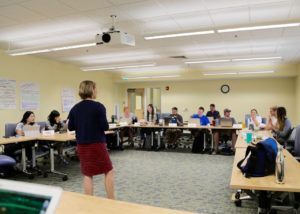 University faculty, along with professionals from food systems stakeholder organizations including dining service companies Aramark and Sodexo, farmers, food aggregators and distributors, and food system labor leaders, led the classroom work. The course also
University faculty, along with professionals from food systems stakeholder organizations including dining service companies Aramark and Sodexo, farmers, food aggregators and distributors, and food system labor leaders, led the classroom work. The course also 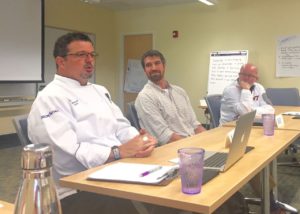 integrated field trips to farms, a produce auction, professional kitchens, and other food systems sites. One such field trip included a day at the innovative Polyface Farm, heavily featured in Michael Pollan’s noted book The Omnivore’s Dilemma and in the celebrated documentary Food, Inc. with discussions led by owner and renowned farmer Joel Salatin.
integrated field trips to farms, a produce auction, professional kitchens, and other food systems sites. One such field trip included a day at the innovative Polyface Farm, heavily featured in Michael Pollan’s noted book The Omnivore’s Dilemma and in the celebrated documentary Food, Inc. with discussions led by owner and renowned farmer Joel Salatin.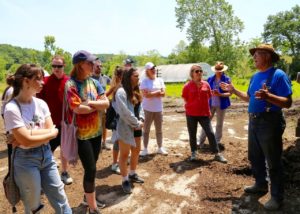
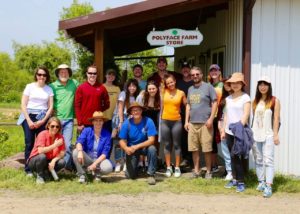
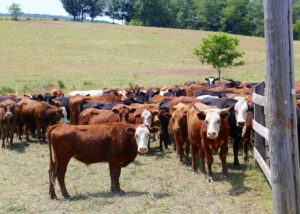
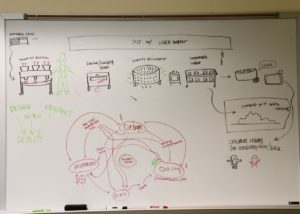

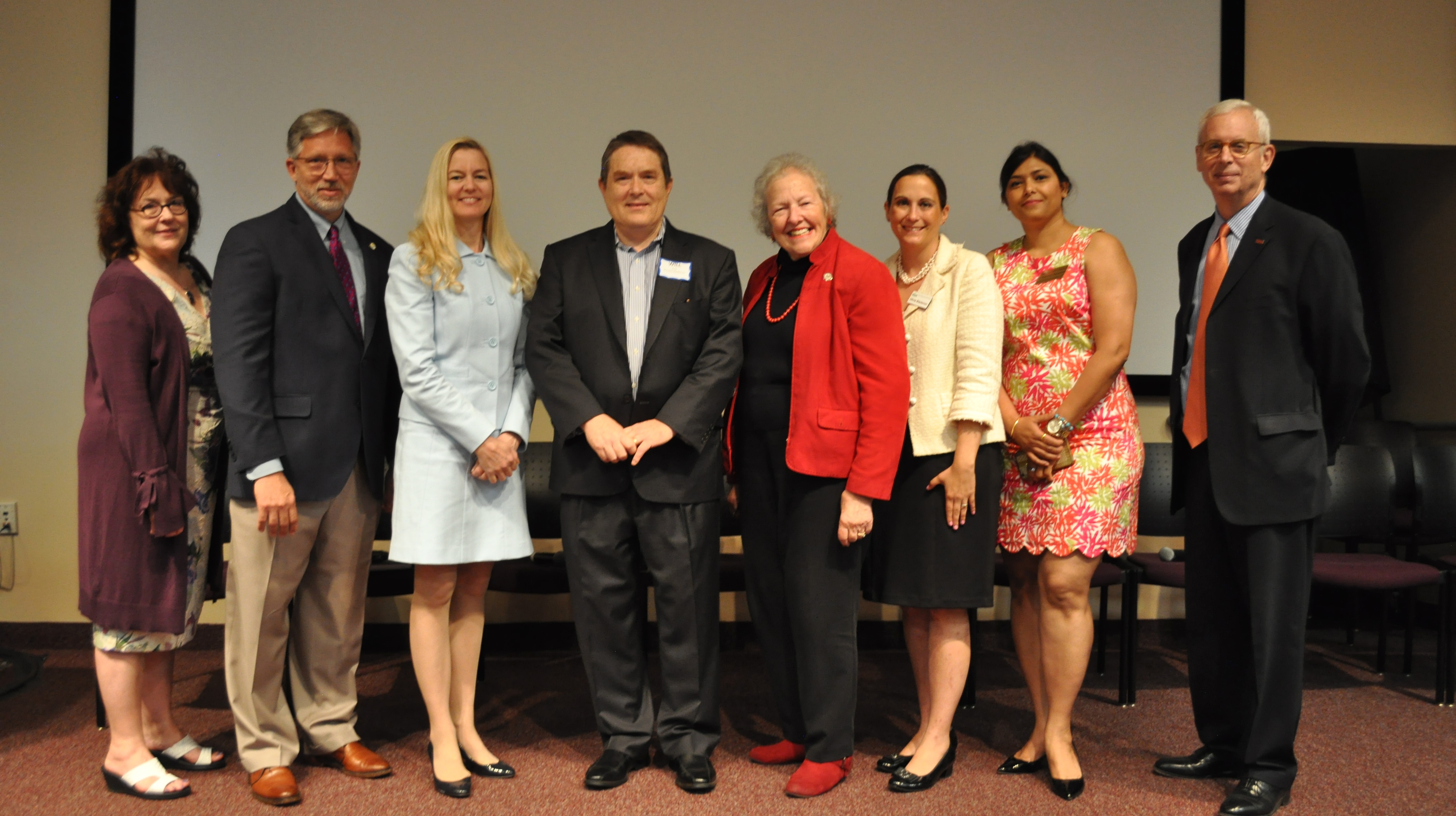
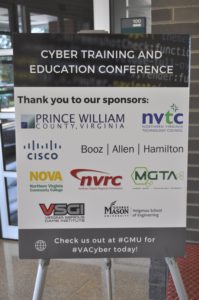 Conference, held on the George Mason University Science and Technology campus in Manassas, Virginia. The conference’s purpose was to tackle a critical issue facing the region — 43,200 vacant jobs in cyber technology waiting for workers.
Conference, held on the George Mason University Science and Technology campus in Manassas, Virginia. The conference’s purpose was to tackle a critical issue facing the region — 43,200 vacant jobs in cyber technology waiting for workers.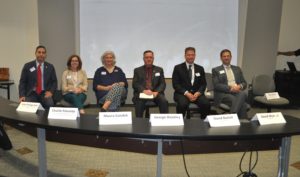 Hundreds of attendees filled the auditorium at the Mason Sci-Tech campus to learn more about the future of cyber technology. The conference offered two tracks – one for teachers interested in developing and delivering curriculum for K-12 students as well as for administrators at area institutions of higher education; the second for veterans interested in applying their skills learned in the armed services to the cyber technology field. Various panels throughout the conference discussed the ways and means to achieve the best outcome to pave pathways to cyber employment.
Hundreds of attendees filled the auditorium at the Mason Sci-Tech campus to learn more about the future of cyber technology. The conference offered two tracks – one for teachers interested in developing and delivering curriculum for K-12 students as well as for administrators at area institutions of higher education; the second for veterans interested in applying their skills learned in the armed services to the cyber technology field. Various panels throughout the conference discussed the ways and means to achieve the best outcome to pave pathways to cyber employment.